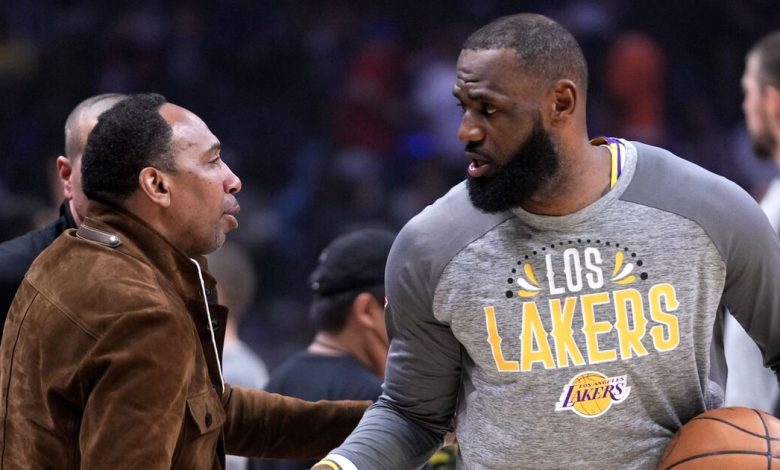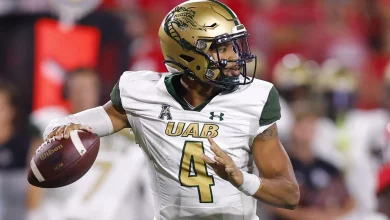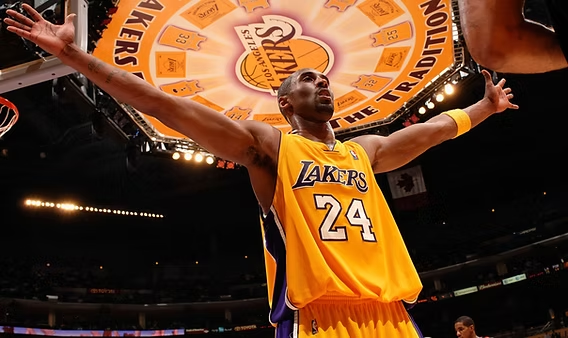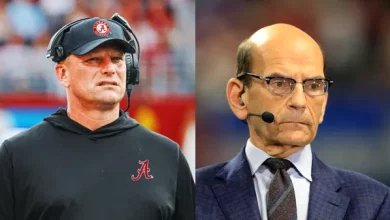Why the Lakers star confronted an ESPN personality during a Knicks game: An explanation of the LeBron James-Stephen A. Smith feud

In the world of sports, where emotions run high and personalities dominate headlines, few incidents are as captivating and contentious as a public altercation between a superstar athlete and a prominent sports media personality. One such altercation occurred during a late-season New York Knicks game, when Los Angeles Lakers star LeBron James confronted ESPN personality Stephen A. Smith. The incident, which took place in front of a packed Madison Square Garden audience, not only shocked fans but also ignited a media frenzy that would continue for weeks. To understand why LeBron James, arguably the greatest basketball player of his generation, confronted one of the most outspoken and controversial sports analysts on television, it’s essential to explore the backstory, the nature of their relationship, and the broader cultural implications of their feud.
A Long-Standing Relationship: LeBron James and Stephen A. Smith
Before delving into the specifics of the confrontation, it’s important to understand the history between LeBron James and Stephen A. Smith. On the surface, the two appear to be part of completely different worlds: LeBron is a global sports icon with millions of fans, while Stephen A. Smith is an ESPN personality, renowned for his sharp takes, often controversial opinions, and his role in shaping sports discourse. However, their paths have crossed countless times over the years, particularly in the context of the NBA.
Smith, who became one of ESPN’s most recognizable faces thanks to his larger-than-life personality, has been a vocal commentator on LeBron’s career since the early days. Stephen A. has offered both praise and criticism of LeBron, with his opinions often making headlines, sparking conversations, and occasionally, causing tensions. For LeBron, who has been under a constant media microscope since he entered the NBA as the first overall pick in 2003, the critiques from Smith were often hard to ignore.
While LeBron has received tremendous admiration and praise from the media throughout his career, he has also faced significant criticism. Some of that critique has come from Smith, especially when LeBron’s performances or decisions were deemed lacking. One of the most notable examples was during LeBron’s time with the Miami Heat when Smith and other analysts criticized the Heat for their inability to win multiple championships immediately after LeBron’s decision to join the team in 2010.
More recently, Smith’s comments about LeBron’s role in the Lakers’ struggles during the 2020-2021 season, where the Lakers were eliminated early in the playoffs, added fuel to their ongoing tension. The narrative that LeBron, despite his greatness, couldn’t elevate his team on his own was something Smith would not shy away from discussing. LeBron, on the other hand, has mostly avoided responding publicly to Smith’s critiques. However, the New York Knicks game incident suggests that there were underlying frustrations boiling beneath the surface, which finally came to a head during a live broadcast.
The Knicks Game Incident: What Happened?
The confrontation took place on a typical mid-season night at Madison Square Garden during a game between the New York Knicks and the Los Angeles Lakers. LeBron James, who had been playing at a high level, was on the court for the Lakers, and the ESPN broadcast was live, featuring Stephen A. Smith as one of the key commentators. During a break in the action, Smith made a comment about LeBron, perhaps questioning his leadership in the wake of the Lakers’ inconsistent performances that season. While this may have been just another of Smith’s trademark bold takes, LeBron, who was sitting courtside, appeared visibly upset.
Without warning, LeBron stood up and walked toward Smith, who was seated courtside near the broadcasting area. As the cameras panned toward the scene, the broadcast became momentarily chaotic. LeBron and Smith exchanged words, with LeBron’s body language making it clear that he was displeased with something Smith had said. From the broadcast angle, viewers could not hear the specifics of the conversation, but it was clear that the confrontation was not a friendly exchange.
Smith, known for his ability to hold his ground and argue his point, seemed to try and defuse the situation with a smile, though it was evident that the interaction was more than a simple misunderstanding. LeBron, who had likely heard enough of Smith’s criticisms over the years, was visibly angry and frustrated. As the altercation continued, Smith’s co-commentators attempted to steer the conversation back to the game, but the focus was now entirely on the confrontation between the two men.
The tension was palpable, and the spectacle became one of the most talked-about moments of the NBA season. In the aftermath, social media exploded with reactions, fans, analysts, and commentators offering their opinions on the situation. Many fans and observers wondered what had prompted LeBron to confront Smith in such a public manner, given their long history of professional interactions.
The Source of the Conflict: What Sparked the Confrontation?
To fully understand why LeBron confronted Stephen A. Smith, it is necessary to explore the potential catalysts for the confrontation. While there is no official statement from either party explaining the incident, several key factors may have contributed to the explosion of emotions.
- LeBron’s Frustration with the Media: LeBron James has been under intense media scrutiny for nearly two decades. While he has become accustomed to being in the spotlight, the criticism and incessant analysis of his every move have taken a toll over the years. For someone who has consistently achieved at the highest level, the constant criticism—even when it appears unwarranted—can grow tiresome. Smith, despite his many accolades as a sports commentator, has often been critical of LeBron’s performances, especially when the Lakers fell short of expectations. For LeBron, it might have felt like the media, including Smith, were quick to undermine his accomplishments and focus on his failures.
- The Media’s Treatment of LeBron’s Legacy: Another factor contributing to the confrontation may have been the ongoing debate about LeBron’s place in NBA history. The conversation about LeBron’s legacy has been a central theme throughout his career, especially as he contends with the likes of Michael Jordan and Kobe Bryant for the title of “Greatest of All Time” (GOAT). The media often fuels this debate, with analysts like Smith taking strong positions. LeBron, who has worked tirelessly to build his legacy, may have grown frustrated with the continued questioning of his ability to win championships or carry a team.
- Smith’s Criticism of LeBron During Key Moments: Over the years, Stephen A. Smith has not been shy in calling out LeBron for perceived shortcomings. One prominent example was during the 2021 playoffs when Smith was critical of LeBron’s performance and leadership in a series loss to the Phoenix Suns. His comments about LeBron’s inability to elevate the Lakers, especially in comparison to other all-time greats, may have weighed heavily on LeBron. Smith’s critiques over the years could have contributed to a growing resentment that finally boiled over during the Knicks game.
- The Timing of the Incident: The timing of the confrontation is also worth noting. LeBron was playing one of the final games of the season, a crucial period for the Lakers as they were fighting for playoff positioning. In this high-stress environment, with his team’s future hanging in the balance, LeBron may have been particularly sensitive to any criticisms, especially from someone as prominent as Stephen A. Smith. The combination of a tight season, media pressure, and Smith’s public comments may have pushed LeBron to confront him directly.
The Broader Implications: Media and Athlete Relationships
The LeBron James-Stephen A. Smith confrontation has broader implications for the relationship between athletes and the media. As social media and sports media coverage continue to evolve, the dynamic between athletes and commentators has become more charged. Athletes like LeBron James, who are acutely aware of their image and legacy, are increasingly willing to push back against criticisms, especially when they feel those critiques are unjust or overly harsh.
The incident also highlights the power dynamics at play in the media. Stephen A. Smith, one of the most influential figures in sports commentary, represents the traditional role of media personalities who analyze and critique athletes’ performances. However, with the rise of social media and athletes’ ability to connect directly with their fans, the line between media coverage and athlete advocacy has become blurred. Athletes, now more than ever, have the ability to respond to criticisms and defend their legacies in real time. LeBron’s confrontation with Smith represents this shift—a moment when an athlete refuses to remain silent in the face of persistent critique.
The Fallout and Moving Forward
The confrontation between LeBron James and Stephen A. Smith was a rare and shocking moment in the world of sports media. It underscored the complex relationship between athletes and the media, especially for superstars like LeBron, who have been the subject of constant scrutiny throughout their careers. While the incident itself was brief, its implications were far-reaching. It reflected the pressures and frustrations that athletes face, and how those emotions can lead to a moment of public confrontation.
As for LeBron and Smith, the confrontation has likely left a lasting mark on their relationship. While it’s unclear whether they will publicly address the altercation further, the incident serves as a reminder of the tension that can arise when personalities from the media world and the athletic world clash. Whether this marks the beginning of a deeper rift or a temporary flare-up, one thing is certain: the relationship between athletes and the media will continue to evolve, and moments like this will be a part of that ongoing narrative.









